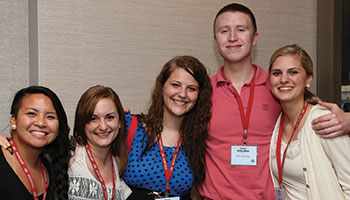Butler Builds a Culture of Research

Butler University students Ashley Asuncion (far left), Angeline Modesti, Allison White, Trevor Spelman, and Emily Lauth
Many faculty mentors consider the APS Convention a can’t-miss event for their students — and nowhere is that attitude more apparent than at Butler University, a small private university located in Indianapolis. Butler joined research giant University of Michigan and three California schools in the top five institutions by number of submissions to the 2014 APS Annual Convention. Forty Butler undergraduates and eight faculty members made the trek from Indiana to San Francisco this year. What’s more, Butler was also a top-five submitter in 2012 and 2013. “Over the years, we have developed a tradition that psychology majors will conduct research and attend professional conferences,” says Butler Psychology Department Chair Robert Dale. “Our students view attending a professional conference as a prize they receive for all of their hard work.” Dale believes that conventions like APS’s inspire the students who attend — and even their peers — to become better scientists. “They return from the conferences energized and motivated to conduct more research. The experiences recounted by each class stimulate the next class to emulate them.” The culture of research runs deep at Butler, where an explicit mission of the psychology program is to prepare students for graduate and professional programs. “It is not enough that a student reads about what psychologists do,” says Dale. “We want the student to do what psychologists do.” That mission seems to be paying off: On average, 60%–65% of the students who graduate from Butler’s psychology department go on to graduate or professional school, and 79% of students who graduated from the program over the last 5 years conducted research with a faculty member during their undergraduate careers. Butler students may earn up to 15 of the 39 psychology credit hours required for their major through research activities. “Our program is relatively small (about 180 majors) but intense,” says Dale. “We reject the concept of a cafeteria-plan curriculum because we want to ensure our students have both breadth and depth of experience.” Butler’s strong showing at the APS Annual Convention shows the department’s students are embracing that hands-on approach to learning.




APS regularly opens certain online articles for discussion on our website. Effective February 2021, you must be a logged-in APS member to post comments. By posting a comment, you agree to our Community Guidelines and the display of your profile information, including your name and affiliation. Any opinions, findings, conclusions, or recommendations present in article comments are those of the writers and do not necessarily reflect the views of APS or the article’s author. For more information, please see our Community Guidelines.
Please login with your APS account to comment.